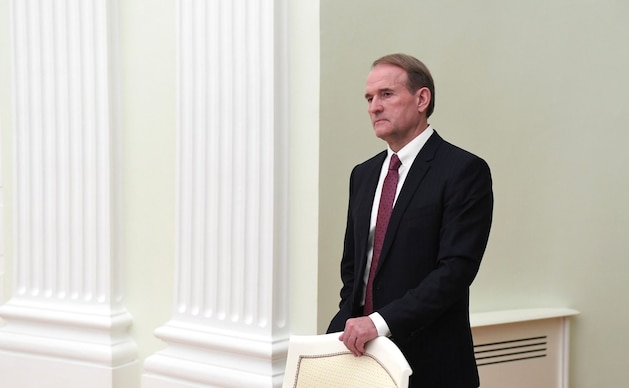After months of radio silence, Ukraine’s pro-Russian politician Viktor Medvedchuk has spoken out again. He revealed his plan to set up an opposition government-in-exile. The Putin friend could serve the Kremlin to overthrow Zelenskyy from within.
In Ukraine, Viktor Medvedchuk was a pro-Russian opposition politician – and is now said to be acting as Putin’s puppet, forming a Ukrainian government-in-exile and overthrowing Ukrainian President Volodymyr Zelenskyy from within. This is reported by the Carnegie Foundation for International Peace.
The experts refer to a guest article by the pro-Russian opposition politician, which he published in the Russian newspaper “Isvestia” after months of radio silence. In it, Putin’s henchman spread his pro-Russian propaganda and announced his return to the public.
Viktor Medvedchuk is the head of the pro-Russian party, Opposition Platform For Life. The oligarch is considered a confidante of Putin and was placed under house arrest in early 2021 on allegations of financing terrorism and treason. Shortly after Russia’s war of aggression in Ukraine began, Medvedchuk attempted to flee but was arrested by the Ukrainian Secret Service (SBU). In September last year, Medvedchuk was finally handed back to the Kremlin in a prisoner exchange for Azov fighters. Since then it had become quiet around him. But now the politician who has fled from the Kremlin is speaking out again.
With Medvedchuk’s public reappearance, the “Carnegie” researchers suspect that Putin wants to use his henchman as a puppet in Ukraine in order to weaken the Ukrainian government. Behind this is possibly the Kremlin chief’s plan to draw parts of the Ukrainian population to the side of Russia with a government in exile. Furthermore, with Medvedchuk as the leader of Ukraine’s pro-Russian political bloc, Putin could bypass any peace talks with Zelenskyy and engage in sham peace talks instead. Medvedchuk would therefore be the key political figure in Ukraine for the Kremlin.
Medvedchuk’s guest article supports this assumption. In his article, the pro-Russian politician pompously writes of his plan to set up a government-in-exile for Ukraine: “A political movement of those who have not given in, who have not given up their convictions, even if they feared death or prison who do not want their country to be the scene of a geopolitical shootout.” Meanwhile, he makes it clear that his goal is to weaken, if not overthrow, the current government in Ukraine. That is why Russia is probably now planning to establish Medvechuk as a political figure in the occupied territories in order to represent a pro-Russian counterweight to Zelenskyy.
Whether the Kremlin’s efforts and Medvedchuk’s quest for power in Ukraine will be successful remains in doubt. The experts at the “Carnegie Foundation” classify his statements in the guest article as worrying, but they explain that Medvedchuk has little political support in Ukraine. Accordingly, he was not particularly popular in any region of Ukraine, even at the height of his party. Instead, he often led rankings of the most unpopular politicians.
In addition, the Carnegie Foundation analyzes that a Ukrainian government in exile under Medvedchuk would most likely not be successful, since there are no signs of dissatisfaction with Zelenskyy among either the Ukrainian population or the Ukrainian elite.
It also remains questionable whether the Kremlin wants to have a puppet government up its sleeve with the return of Medvedchuk if the Russian armed forces want to invade Kyiv again in a new offensive.















